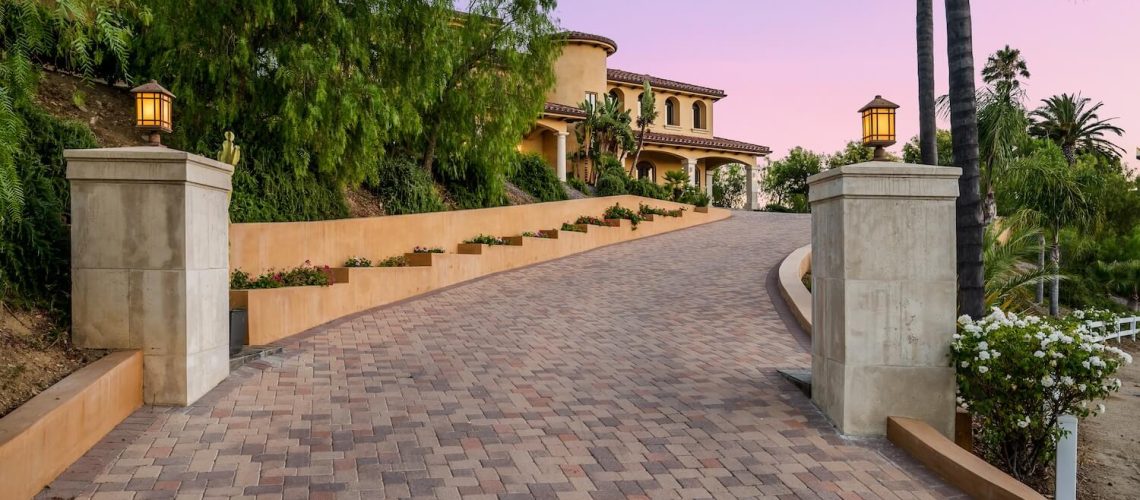In the face of unpredictable weather patterns and the increasing frequency of heavy rainfall, it’s more important than ever for homeowners to ensure that their properties are equipped to handle the challenges posed by rain. While much of the focus in flood prevention and water management tends to be on the foundation and landscaping of a property, one crucial area often overlooked is the driveway. Your driveway not only serves as a functional space for parking and accessing your home but can also play a critical role in managing stormwater runoff and preventing flooding.
A well-designed and properly installed driveway can help mitigate the impact of heavy rain, keep water from pooling, and protect your home’s foundation from water damage. One of the best solutions for achieving these goals is to choose pavers for your driveway. Pavers are becoming increasingly popular due to their ability to provide exceptional drainage, durability, and aesthetic appeal.
In this article, we will explore the myriad advantages of installing a paver driveway, particularly in areas prone to rainy weather, and how this choice can effectively flood-proof your home.
1. Understanding the Rainwater Runoff Problem
Before delving into the specific benefits of pavers, it’s important to understand the broader issue of rainwater runoff and its impact on your property. When it rains, water has to go somewhere, and depending on the surface type of your driveway, it may either be absorbed or directed elsewhere. Traditional driveways made of concrete or asphalt are non-permeable, meaning they do not allow water to pass through them. Instead, water flows across the surface, often pooling or running off to surrounding areas. This is where problems arise.
Excess water runoff can cause several issues for homeowners:
- Flooding: When water cannot be absorbed by the surface, it quickly flows into nearby areas, potentially flooding your driveway, garage, or even your home’s foundation. In extreme cases, flooding can damage your landscaping and erosion can occur, weakening the structural integrity of your driveway and surrounding landscape.
- Erosion: Water runoff can erode the edges of your driveway, causing uneven surfaces and deterioration. Additionally, if the runoff is directed toward your home, it can contribute to soil erosion, which weakens your landscape and creates puddles or wet spots.
- Overburdened Drainage Systems: If a large amount of water is not absorbed by the driveway surface, it can overwhelm your yard’s drainage system, causing water to back up or flow toward unwanted areas of your property.
- Pollution Runoff: Water running off impermeable surfaces can collect dirt, oil, and other pollutants, which may eventually end up in nearby water systems, contributing to pollution and water contamination.
The simple solution to these problems lies in increasing the permeability of your driveway. This is where pavers come in, offering an environmentally friendly and practical way to manage water flow during rainy weather.
2. How Pavers Improve Drainage: The Science Behind Permeability
Pavers, when used correctly, provide a unique solution to rainwater runoff issues because they are permeable. Unlike concrete and asphalt, pavers have built-in gaps between them that allow water to pass through the surface and infiltrate the ground. This process is known as permeable paving, and it offers a range of benefits that help mitigate the effects of heavy rainfall.
Key Rain Drainage Benefits of Pavers:
- Natural Water Absorption: When it rains, water is absorbed through the joints between individual pavers. This allows it to percolate into the underlying soil, rather than flowing over the surface. The porous nature of pavers ensures that rainwater is efficiently absorbed into the ground, where it can recharge the local groundwater table, benefiting both the environment and your landscaping.
- Reduced Surface Water Runoff: Traditional impermeable surfaces like asphalt and concrete cause water to run off quickly, which can lead to erosion and pooling. Pavers, however, significantly reduce the volume of water that flows off the surface, making them ideal for flood-prone areas. By allowing water to pass through the pavers into the ground, they help direct water away from your home and ensure that it doesn’t overwhelm nearby drainage systems.
- Prevention of Flooding: When water seeps through the paver joints, it doesn’t have a chance to pool on the surface, drastically reducing the chances of flooding in your driveway or surrounding areas. Especially during periods of heavy rain, this permeability can prevent the accumulation of water that could otherwise create hazardous conditions or cause driveway damage.
- Enhancement of Existing Drainage Systems: Even if your property has a drainage system in place, permeable pavers enhance the system’s ability to handle excess water. Water flows more easily into the ground, preventing the drainage system from becoming overburdened and reducing the risk of clogs or backups.
3. Durability of Pavers: Built to Withstand the Elements
While water drainage is a key benefit of pavers, it’s not the only one. Pavers are also known for their exceptional durability, particularly when it comes to withstanding heavy rain and harsh weather conditions. When it comes to driveways, durability is of the utmost importance, as these surfaces are subject to constant wear and tear, from vehicles driving over them to exposure to the elements.
Why Pavers Are Ideal for Rainy Weather:
- Freeze-Thaw Resistance: In regions where freezing and thawing cycles are common, traditional concrete and asphalt driveways can crack and buckle as water seeps into small fissures, freezes, and expands. Pavers, on the other hand, are far more resilient to these temperature changes. Because the individual pavers are laid with gaps and are not solid slabs, they are less likely to crack or warp under pressure from freezing water.
- Non-porous, Yet Flexible Materials: Many pavers, such as those made from natural stone or high-quality concrete, have a dense yet flexible surface that prevents water from penetrating or pooling on the surface. At the same time, they allow enough space between the pavers for water to be absorbed into the ground, which helps to prolong the life of the driveway and prevents degradation from constant exposure to moisture.
- Sturdy Under Heavy Loads: Pavers are designed to handle the weight of vehicles without cracking or shifting. Concrete and asphalt surfaces are more prone to cracking over time due to the constant weight of cars and trucks. Pavers, by contrast, are made to withstand even the heaviest vehicles and are more resilient to the pressure of frequent rainstorms.
- Long-Term Performance: Unlike asphalt or concrete, which may need to be sealed regularly or resurfaced every few years, pavers require minimal maintenance. With proper installation, pavers can last for decades without showing significant wear, providing a long-term solution for homeowners seeking a flood-proof and durable driveway.
4. Aesthetic Appeal and Design Flexibility of Pavers
While functionality is crucial, homeowners also want their driveways to complement their home’s aesthetic. One of the standout features of pavers is their versatility in design. Pavers come in a variety of materials, sizes, colors, and shapes, giving homeowners the ability to create a unique and visually appealing paver driveway that enhances its curb appeal.
Paver Design Options for Every Home Style:
- Concrete Pavers: Concrete pavers are a popular choice for homeowners looking for versatility and a clean, modern look. They can be molded into various shapes and sizes and come in a range of colors and finishes to suit any design preference.
- Natural Stone Pavers: Natural stone, such as slate, flagstone, and limestone, offers a rustic, timeless look that pairs well with traditional or historic homes. These materials also provide excellent drainage properties and are often more durable than their concrete counterparts.
- Brick Pavers: Brick pavers are an ideal choice for creating a classic, old-world charm. Their earthy red tones and uniform shape add warmth and elegance to any home, making them particularly suitable for more traditional or country-style properties.
- Patterned Pavers: You can opt for various patterns when installing your paver driveway, such as herringbone, basket weave, or running bond. This adds to the visual appeal of the driveway and allows you to express your style while simultaneously improving the function of the driveway.
5. Eco-Friendly and Environmentally Responsible
Pavers are a highly eco-friendly option for driveways, particularly when compared to other surfaces like asphalt and concrete. Their permeability not only helps with flood-proofing but also promotes sustainable practices:
- Reduction of Stormwater Runoff: By allowing water to filter through the driveway, pavers reduce the need for extensive stormwater management systems, which can often be expensive to install and maintain.
- Recycling Materials: Many pavers are made from recycled materials, including crushed stone, concrete, and even recycled glass. This helps reduce the environmental impact of the materials used for your driveway while promoting the use of sustainable building practices.
- Wildlife-Friendly: Permeable surfaces help manage rainwater in a way that promotes the health of local ecosystems. Water is filtered into the ground, nourishing plants and trees rather than flowing into storm drains that contribute to pollution.
6. Installation: Ensuring Maximum Effectiveness
While installing pavers might seem like a DIY project, there are certain steps that must be followed to ensure they perform optimally. Professional installation is recommended to make sure that the base is properly prepared, that the right type of pavers is used, and that the driveway is laid with proper grading for optimal water flow.
Steps for Effective Paver Installation:
- Preparation of the Base: A solid foundation is crucial for ensuring that the pavers perform as intended. This includes compacting the soil and laying down a layer of gravel to help with drainage.
- Proper Grading: The driveway must be sloped in such a way that water is directed away from the home and into the landscape or drainage system. Proper grading ensures that the pavers can effectively manage rainwater.
- Proper Jointing: The gaps between the pavers need to be filled with sand to stabilize them and prevent shifting. This also ensures that water is able to percolate through the joints and into the ground.
- Regular Maintenance: While pavers are low-maintenance, occasional cleaning and re-sealing may be necessary to ensure they maintain their visual appeal and drainage functionality over time.
Conclusion: Invest in Pavers for a Flood-Proof, Durable Driveway
In conclusion, pavers offer an unparalleled combination of functional benefits and aesthetic versatility, making them an ideal solution for homeowners looking to flood-proof their driveway. With superior drainage capabilities, durability against the elements, and a variety of design options, pavers provide a long-lasting, eco-friendly, and visually appealing option that will protect your home from the dangers of heavy rain and flooding. Whether you live in an area prone to heavy storms or simply want to enhance your driveway’s performance, pavers are an excellent investment that will continue to deliver benefits for years to come.
By choosing pavers for your driveway, you’re not only improving the functionality of your property, but you’re also adding lasting beauty and protecting your home from the risks associated with water damage and flooding. So, consider making the switch to pavers and flood-proof your driveway today!

